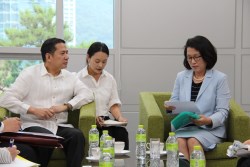



PHL AMBASSADOR ADDRESSES TRAFFICKING IN WOMEN WITH KMRB CHAIR
By: Embassy of the Republic of the Philippines, Seoul
By: Embassy of the Republic of the Philippines, Seoul
BUSAN, 12 August 2015 – Seeking to address the problem of trafficking of Filipino women in South Korea, Philippine Ambassador Raul S. Hernandez met with the head of the South Korean agency in charge of recommending the entry into the country of foreign entertainers who may sometimes be vulnerable to exploitation by recruiters or promoters.

Philippine Ambassador to Korea Raul S. Hernandez discusses with Korea Media Rating Board (KMRB) Chairperson Lee Kyong-sook the proposed measures on how to manage the entry and sojourn of Filipino entertainers in Korea in the meeting at the KMRB headquarters in Busan on 11 August 2015.
The KMRB, an office under the Ministry of Culture, Sports and Tourism (MCST), functions like the Movie and Television Review and Classification Board (MTRCB) in the Philippines by classifying films, videos and other motion pictures into age-based ratings and recommends domestic performances of foreign artists.
More relevant to the situation of overseas Filipino workers, the KMRB is the South Korean government agency responsible for issuing the recommendation letter for the entry of foreign entertainers subject to immigration regulations. The letter becomes the basis of the Korean Immigration Service for the issuance of the entertainer or E-6 visa by the Korean Embassy.
It is our mandate to protect our nationals, hence I am personally seeking your help to address the issue of our women entertainers in South Korea," said Ambassador Hernandez, who was accompanied by Consul General and First Secretary Iric C. Arribas, Labor Attaché Felicitas Q. Bay and Assistance to Nationals Officer Glenn F. Corpin in his meeting with Chairperson Lee.
There is disparity in the number of entertainers who entered Korea and the number of employment contracts approved by the Philippine Embassy, in all likelihood, those who did not undergo Philippine government requirements may have been victims of trafficking," said Ambassador Hernandez.
He said nearly 70 percent of holders of E-6 visas are Filipinos and almost half are rendered undocumented as of June 2015. There is something alarming in their situation and some of them have reported their plight to the Embassy. It is my obligation to look for measures to this problem," Ambassador Hernandez further stressed to Chairperson Lee.
Noting that it was the first time a head of a foreign mission visited the KMRB, Chairperson Lee replied: We are pleased with your visit, however it is sad to hear stories of Filipino women who apparently fell prey to recruiters/promoters and establishments in violation of the law.
She added that the KMRB is aware of the seriousness of the problem and assured the Ambassador that it has in fact imposed stricter rules on the issuance of the recommendation letter such that only about 25 percent of applicants are approved. 밠oreover, we are in active coordination with investigation and law enforcement agencies to avert any violations," she said.
밚et us put in place measures so that violations will not occur and I believe that an Embassy verified contract submitted to the KMRB will reduce incidents of trafficked entertainers," Ambassador Hernandez suggested to Chairperson Lee as a specific measure to protect prospective Filipino E-6 visa applicants.
The U.S. government released its 2015 Trafficking in Persons (TIP) Report and the Republic of Korea's category remained at Tier 1, which indicates that it fully complies with the minimum standards for the elimination of trafficking.
However, the TIP report recommended among other items for South Korea to increase monitoring and establish measures to address trafficking vulnerabilities in Korean government issued entertainment visas, including verifying contracts and monitoring establishments.
As of June 2015, there are 3,490 Filipino entertainers in Korea and from this number 1,550 are undocumented.
– END–



